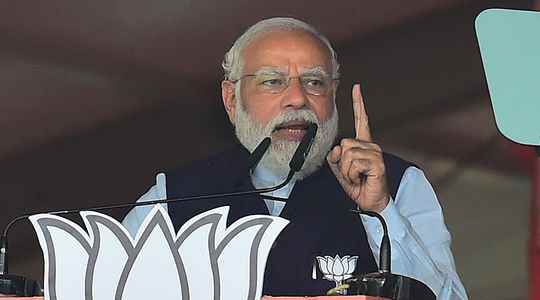In India, Uttar Pradesh is getting all the attention. The results of the regional elections in this state, considered the political barometer of the country, should finally be known this Thursday, March 10. Will the Bharatiya Janata Party (BJP) of Prime Minister Narendra Modi manage to stay in power there, despite the widening of inequalities and its catastrophic management of the pandemic?
READ ALSO >> In India, the schools of Hindu supremacists “take liberties with the facts
For more than a month, the most populous state in India – more than 240 million inhabitants – located in the north of the country, went to the polls to renew its local assembly in the context of legislative elections. . Four other states followed the same process: Uttarakhand (North), Punjab (North), Goa (South) and Manipur (North East). The BJP is in power in all these regions, except in Punjab, led by the historic Congress party.
Sulphurous diatribes against Muslims
Two years before the general elections, this election is a test for the BJP and for Narendra Modi, the main face of the party’s campaign, and who intends to keep his post, which he has held since 2014. New Delhi passes through Uttar Pradesh because during the general elections, this state alone sends 80 parliamentarians to the Lok Sabha, the lower house of Parliament, it is more than any other state”, underlines Arati R. Jerath, political analyst. India does not have a direct suffrage system and the Prime Minister is not elected by the citizens: he is appointed by the party that wins the elections.
The results of this local poll will also give an indication of how the BJP’s ideological project is perceived. The Hindu nationalist party has made this state the laboratory of its extremist policies. Yogi Adityanath, the fanatical monk who has run it since 2017, is a regular in sulphurous diatribes against the Muslim minority – which represents 20% of the population of Uttar Pradesh.
Yogi Adityanath “loudly proclaims his hatred of Muslims, his intolerance, his disgust with the opposition and his impatience with the intricacies of the Constitution [laïque]“, thus denounced Harsh Mander, an Indian human rights activist in a column published at the end of last year by the daily The Hindu. “His government practices religious intolerance and incitement to violence, just like the Taliban,” he said.
Growing inequality
Over the past five years, the BJP has declined the hindutva, this ideology that advocates Hindu superiority, in different forms. He targeted the beef industry, dominated by the Muslim community, but also interfaith marriages in the name of the fight against the “jihad of love”. According to this myth propagated by Hindu extremists, Muslim men try to seduce Hindu women for the sole purpose of marrying them to convert them to Islam.
But these elections come after the terrible wave of Covid-19 that hit India last spring. The government had come under heavy criticism for its handling of the pandemic which officially claimed the lives of more than 500,000 people. Figures largely underestimated, according to experts. In Uttar Pradesh, the images of bodies floating on the Ganges had horrified the whole country.
The pandemic has also created gaping inequalities within the subcontinent. According to a survey by the People’s Research on India’s Consumer Economy (PRICE), a Bombay-based think tank, the annual income of the bottom 20% plunged 53% in 2020-21, compared to their 2015- 2016. The incomes of the richest 20% have increased by 39%.
The main opponent of the Hindu nationalist party in Uttar Pradesh, the Samajwadi party, has sought to exploit the discontent generated by the economic situation. Where the BJP campaign has focused on religious issues. “These elections will tell if it is possible to win simply by creating divisions between religious communities. On the other hand, if voters mobilize on economic issues, it will will have serious consequences on the general elections of 2024 and will offer a platform to the opposition”, advances Arati R. Jerath, for whom “if the BJP does not win, questions will also arise internally on the ideological project of the party” . For this observer of Indian politics, the BJP, which won 303 of the 403 seats in the local Assembly in 2017, will find it difficult to reproduce this feat.
